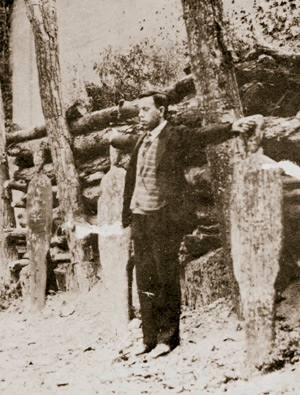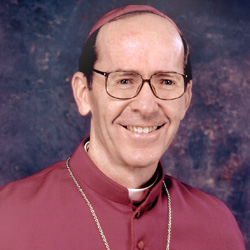Editor’s note: This is the second part in a series of columns by Bishop Thomas J. Olmsted that celebrated of the holy Year for Priests. It was originally published Nov. 5, 2009.
From his earliest years as a child, Miguel Pro loved to play practical jokes and to make people laugh. He could mimic the voices and mannerisms of family members, neighbors and friends; he could see the funny side of life’s many ups and downs; he could convert an overly-serious discussion into a light-hearted recognition of what truly mattered and what was of no import at all. Without a doubt, he agreed with the wisdom of Psalm 100,“Cry out with joy to the Lord, all the earth. Serve the Lord with gladness. Come before Him, singing for joy.”

His cheerful disposition won him friends wherever he went, among all classes and ages of people, from the tough men who worked in the mining camps where his father was employed as an engineer to his seminary classmates and the youth he taught in school. He delighted in drawing funny caricatures and in making up silly lyrics for songs. With cartoons and with music, he turned gloomy days into ones that sparkled with humor and charm.
His ability to play practical jokes deflected attention away from his own bad health, including his stomach ailments that nearly brought about an earlier end to his life. With a guitar in his hand and a smile on his face, he coped with homesickness while studying far from his homeland and with deep concerns about his large and close-knit family during the ever increasing Catholic persecution in Mexico.
Quick wit to serve the Gospel
But his quick wit was especially helpful when he returned as a Jesuit priest to Mexico in 1926. Since he was legally forbidden to carry out priestly functions, Padre Miguel Pro improvised disguises both humorous and serious to distract the police and military so that he could carry on his priestly ministry in secret. One day he would walk the streets dressed as a mechanic and the next day he might be sporting the top hat and moustache of a magician or stand-up comic.
Few saints of the Church have possessed a sense of humor as quick as that of Padre Pro. At the same time, joy is a common trait of the Church’s martyrs. Already in the New Testament, we have the witness of the Apostles who, after being arrested, flogged and threatened (Acts 5:40ff), “left the presence of the Sanhedrin, rejoicing that they had been found worthy to suffer dishonor for the sake of the name [of Jesus].” Of the 12 Apostles, 11 of them gladly died for Christ as martyrs. Most of the popes of the first three centuries suffered martyrdom for the sake of the Gospel. Alongside them were countless priests and bishops, virgins and lay men and women of all ages and ranks of society, willingly stepping forward to bear joyful witness to the Lord.
 The Second Vatican Council teaches (Lumen Gentium, #42), “Since Jesus, the Son of God, has manifested His love through the surrender of His life, no one has greater love than the one who surrenders his life for Jesus and his brothers and sisters (cf. 1 Jn 3:16; Jn 15:13). To give this highest witness of love for all, particularly for one’s persecutors, has been the calling of some Christians from the earliest times and will always be. The Church considers martyrdom, which makes the disciple similar to the master in the free acceptance of death for the salvation of the world and which makes them equal in the shedding of blood, as a splendid gift and as the highest proof of love.”
The Second Vatican Council teaches (Lumen Gentium, #42), “Since Jesus, the Son of God, has manifested His love through the surrender of His life, no one has greater love than the one who surrenders his life for Jesus and his brothers and sisters (cf. 1 Jn 3:16; Jn 15:13). To give this highest witness of love for all, particularly for one’s persecutors, has been the calling of some Christians from the earliest times and will always be. The Church considers martyrdom, which makes the disciple similar to the master in the free acceptance of death for the salvation of the world and which makes them equal in the shedding of blood, as a splendid gift and as the highest proof of love.”
Through the Sacred Liturgy, the Church prepares everyone to live for Christ and also to die for Him. Without a doubt, this is why Padre Miguel Pro risked his life to provide the Eucharist and the Sacrament of Confession during the time of persecution. Moments before he was arrested and led to the jail where he would be martyred, he urged his brothers who shared the hiding place with him to repent of their sins and, then, he quickly administered to them sacramental absolution.
Joyful adventures with Jesus and Mary
Joy and courage are authentic proof of the presence of God. Their effervescence rises from the wellsprings of communion with the Lord and with all His holy ones, especially with His Blessed Mother. Not surprisingly, saints like Blessed Miguel Pro had deep devotion to Christ and to His Mother. Just 10 days before his martyrdom, he wrote a beautiful prayer to Our Lady expressing his filial love. His prayer included the following words: “Let me live my life at your side, my Mother, and be the companion of your bitter solitude and your profound pain… For my life, I desire the jeers and mockery of Calvary; the slow agony of your Son, the contempt, the ignominy, the infamy of His Cross. I wish to stand at your side, most sorrowful Virgin, strengthening my spirit with your tears, consummating my sacrifice with your martyrdom, sustaining my heart with your solitude, loving my God and your God with the immolation of my being.”
We can be sure in faith that Our Lady of Guadalupe and her divine Son were with this courageous priest as he walked to his execution and bravely gave up his life for Christ. They were there to welcome and escort him into the glories of heaven. Several weeks before his death, he had written with great confidence of God’s loving providence, “I see His hand so palpably in everything that I almost, almost fear that they won’t kill me in these adventures — which would be a disaster for me because I sigh to go to Heaven and start throwing out arpeggios on the guitar with my guardian angel!”
Get ready for explosions
The history of the Church is a history of martyrs. The 20th century saw more martyrs than any previous ones. Rather than stifling her growth, fierce persecution has had the opposite effect. It has made the faith grow stronger. This is certainly true in Mexico, through the faithful witness of Blessed Miguel Pro and his many companion-martyrs.
Should we expect, in our day, not to face opposition for the sake of the Gospel? Should we priests expect to be treated with honor in the public square, or should we rather expect to share not only in Christ’s priesthood but also in his mission as victim? We would do well to remember the words of the Maryknoll missionary to China, Bishop James Edward Walsh, who wrote: “Christianity is not a private way of salvation and a guide to a pious life; it is a way of world salvation and a philosophy of total life. This makes it a sort of dynamite. So when you send missioners out to preach it, it is well to get ready for some explosions.”





![[VIDEO] Make Sunday feel like Sunday again](https://www.catholicsun.org/wp-content/uploads/2021/04/2021-YOUTUBE-BISHOP-MESSAGE-THUMBNAIL-ENGLISH-218x150.png)
